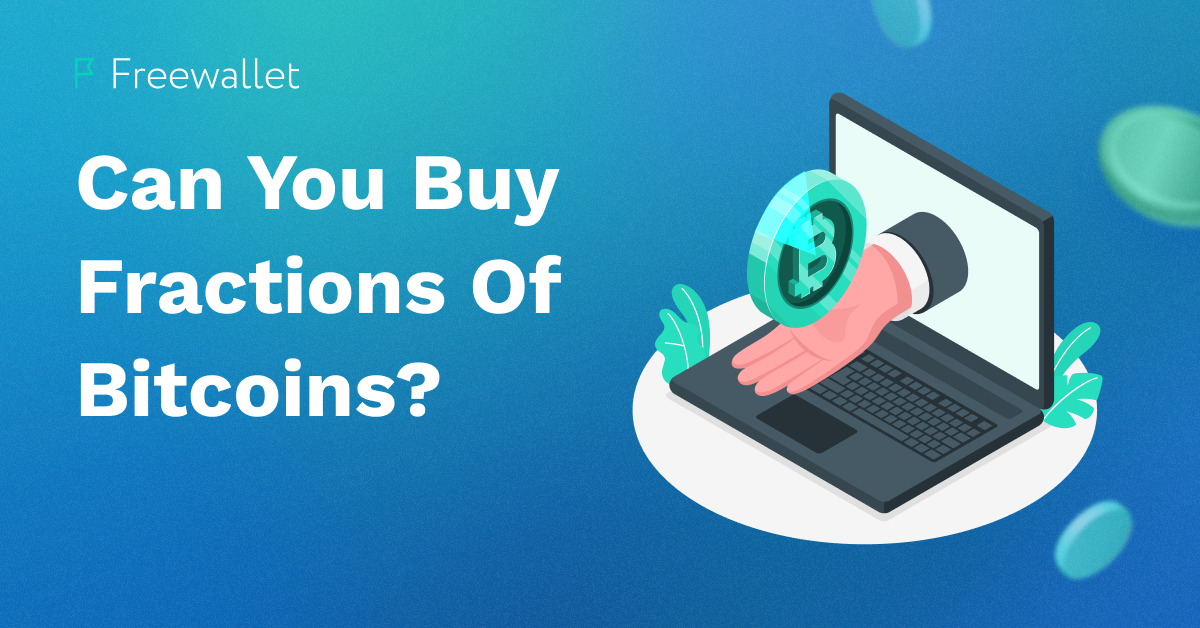
The answer is yes, you can buy a fraction of a Bitcoin.
In this article, we will talk about the characteristics of this cryptocurrency, and tackle what fractions of Bitcoin are and how to get them.
If you’re asking can I buy a fraction of a Bitcoin? go on reading to find all the answers you need.
What are Bitcoin fractions?
Bitcoin fractions are smaller units of Bitcoin.
Maybe, Satoshi Nakamoto had no idea that its creation would be so successful and that this cryptocurrency would be perceived as a store of value someday, but fortunately, its design allows anyone who wants to own BTC to own it without spending thousands of dollars.
In fact, you can own a fraction of Bitcoin – even a very small fraction.
This is good news for all those who want to invest in this crypto, whose tokenomics shows many of the signs that make an asset gain value over time.
Nevertheless, you should be aware that just because BTC is available to everyone and for all budgets doesn’t mean that you can underestimate possible unfortunate consequences: being a financial asset, it always involves risks you should be aware of.
The scope of this article is to answer questions related to Bitcoin fractions, so let’s start by understanding how small a fraction of BTC can be.
How divisible is Bitcoin?
The smallest fraction of Bitcoin you can buy is 100 millionth of Bitcoin. This fraction is called Satoshi – after the name of the founder of the crypto project.
So, the smallest amount of Bitcoin you can own is 0.00000001 BTC, but we’ll see throughout this article that it’s not that easy, and not even useful in terms of profits, to get such a small amount of Bitcoin.
If you’re asking what fraction of Bitcoin can I buy? there are at least two things you should consider:
- The platform you’re going to use;
- Your trading goals.
How to buy a fraction of Bitcoin
To buy a fraction of Bitcoin you can use both decentralized and centralized crypto exchanges.
Both options have pros and cons:
- If you use a decentralized exchange, you don’t have to go through KYC (Know Your Customers) procedures to verify your identity and you usually have no limits. But at the same time, you’ll need a deeper knowledge of the decentralized space to be able to manage your decentralized wallet. Moreover, if you lose the keys to your wallet there won’t be anyone able to help you to recover access to your Bitcoin funds.
- If you use a centralized exchange, you’ll need to verify your identity and entrust your keys to the exchange, but you’ll be able to benefit from more intuitive interfaces and get support in case of trouble.
There are also more easy options: Freewallet is one of these.
Freewallet allows you to complete a simplified KYC procedure to give you faster and easier access to your personal area, where you’ll be able to buy Bitcoin with a card, get a dedicated wallet and even top up your phone with Bitcoin.
Buying fractions vs 1 whole Bitcoin
Traders can choose to buy BTC fractions or entire units of Bitcoin, and the choice may depend on several elements:
- Of course, a whole BTC is more expensive. Even though this crypto asset is highly vulnerable towards volatility, its price is consolidated at around tens of thousands of dollars. At the time of writing – May 15th, 2022 – the price of BTC amounts to around 29,700 USD according to CoinMarketCap. This price comes after a strong collapse of crypto assets that affected even stablecoins – in fact, BTC has an all-time high (ATH) of 68,000 USD experienced in November 2021.
BTC/USD price chart. Source: CoinMarketCap.
Of course, a whole BTC allows you to get higher profits if the price of Bitcoin rises.
- On the other hand, buying fractions of Bitcoin makes this asset affordable to all traders and investors. Fractions allow you to spend even a few dollars to own a part of the first crypto by market cap, but – and this is a downside – you’ll have lower profits in case of a rise in prices.
To give you a practical example, let’s consider a scenario in which the price of BTC rises by 10% starting from the current price.
If you own 1 BTC, you’re going to get +2,970 USD.
If you own, let’s say, 0.005 BTC, you get +14.85 USD.
Note: these calculations are made without taking into account entry and exit fees.
Understand crypto before investing in crypto
Fees can actually affect your trading activity more than you might think.
As we mentioned before, you have more than one option to buy Bitcoin, and when you use centralized exchanges you should consider that they charge fees also to cover the services they provide. In any case, fees are charged to allow transactions to be recorded on the blockchain, and they’re something you should always take into account to evaluate your net profits and losses.
Fees are a fundamental part of your trading activity, also because they’re used to reward the validators – so to allow the network to work properly.
Many cryptocurrencies – and also Bitcoin – allow you to choose different amounts of fees – this is mainly possible when you want to make direct transfers. The higher the amount of fees you’re willing to pay, the faster your transactions. Moreover, you might not be able to transfer the whole amount of your Bitcoins. When you’re not able to finalize an entire trade at the same price, it might happen that very small fractions of your funds can’t be transferred because you don’t have enough BTC to cover the fee.
Bitcoin average fees. Source: YCharts.
All traders who don’t know this info may find it hard to navigate the crypto space and to fully understand how crypto trading works. Because of this, if they don’t know what to expect, they can’t appropriately evaluate the outcome of their trades – as well as actual profits and losses.
That’s why it’s fundamental to know the asset you want to trade and the platform and wallets you want to use: look for possible limits, understand the tokenomics of your asset, learn how to properly transfer and use it, take fees into account and evaluate the best option according to your needs.
Knowledge is more important in the crypto space, compared to traditional markets, because you need to work and trade as an autonomous entity.
Why cryptocurrency is the future
The main pro of cryptocurrencies is actually this – decentralization.
Crypto enthusiasts know it very well: there is no central authority that can control the Bitcoin network.
Of course, this requires traders and investors to be more responsible about their funds, but this also means that you’re in full control of your financial assets.
Opponents of cryptocurrencies rely on the absence of real underlying value to justify their doubts – why should assets that only exist in the digital space have such high prices? But cryptocurrencies – including Bitcoin – rely on economic and financial principles that have always worked – decentralization just makes the system inclusive.
That’s why cryptocurrencies are the future – they allow people to own financial assets without the need for banks or governments.
FAQs
- Can you buy half a Bitcoin?
Yes, the smallest fraction of Bitcoin you can buy is 100 millionth BTC.
- Do you have to buy a whole Bitcoin?
No, you can also buy fractions – of course, your profits and losses will depend on the quantity you own.
- What is the smallest amount of Bitcoin I can buy?
In general terms, the smallest unit of Bitcoin you can buy is 1 Satoshi (that is, 0.00000001 BTC), but not all exchanges support trades with this fraction.
- Where can I buy fractional shares of Bitcoin?
You can buy them on centralized and decentralized exchanges that support Bitcoin.
- Can you sell a fraction of a Bitcoin?
Yes, you can both buy and sell fractions of Bitcoin.
Related
Stay tuned
Subscribe for weekly updates from our blog. Promise you will not get emails any more often.
Most Popular
New Posts
Stay tuned
Subscribe for weekly updates from our blog. Promise you will not get emails any more often.






